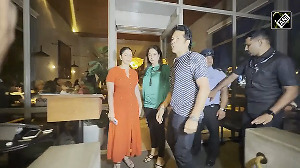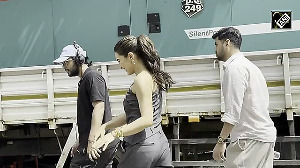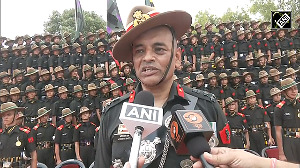France on Friday expressed optimism over a ten-fold increase in trade with India in this decade from $1.71 billion in 2001-02, and has asked its business chamber MEDEF to conduct a study to identify the factors that was hindering trade and investments.
"We consider that Indo-France trade can go up two times or even to 10 times in the coming years," Delegate Minister for Trade & Commerce of France, Francois Loos, said at a CII meeting in New Delhi.
France, which took 35 years to open up and remove customs barrier, was looking forward in furthering cultural ties with India along with trade and investment, he said.
Mouvement des Enterprises de France president, Ernest Antoine said Indo-French ties in space and aviation could be replicated in other sectors like manufacturing, agro food, environment and urban infrastructure.
Exports and imports, which have been limited so far, can increase at least five times by 2008, he added.
Referring to French Prime Minister Jean-Pierre Raffarin's visit with a team of MPs and businessmen, Antoine said, "All these demonstrate that we can do more. India has to remove its tariff barriers to improve the trade climate."
On agri subsidies, he said France has committed to change its agri policies and phase out subsidies by 2006.
The MEDEF chief also said a study is underway to know why French companies prefer China to India, and how to improve the trade relation.
"We have evidences that it is now possible to manufacture in India as it is in China. We will like to have Indian talent to join with French expertise to increase cooperation between the two countries," he said.
MEDEF managing director, T Courtaigne, said there were 550 French companies operating in China while the number was only 180 in case of India.
The first impression one gets of the difference was that India opened up its economy 12 years later than China, he said, adding the Chinese were marketing themselves in a more aggressive way than the Indian industry.
French business interest in India was mainly restricted to the government organisations especially in the areas of infrastructure and equipments.
Bureaucratic delays had hindered French companies from expanding their activities.
Antoine said foreign direct investment by French companies in India was also part of the broad objective to strengthen the relationships. "It took time for France to look towards US, and then to China. Now they are looking towards India," he said.
During a meeting with Arun Jaitley, Union Minister of Commerce and Industry, French Minister for Economy, Finance and Industry Francis Mer expressed his concern over the project preference policy of India in favour of its state-owned companies and sought reversal of the same.
Mer also expressed concern about certain issues, particularly relating to market access, especially in the wine sector, where he sought further reduction in customs tariff in India.
Jaitley assured the French minister that the tariff rate had been coming down.
India, on its part, expressed concern over the excessive measures that the European Union resorted to in the case of cotton bed-linen.
Jaitley said he also raised the matter of France's rejection of consignments of sea-food from India on the ground that they were not complying with the standards.
He said in one case instead of returning the consignment the French authorities chose to destroy them.
Apart from bilateral trade, multilateral trade issues in the context of ongoing WTO negotiations also figured in the discussions.
The French minister expressed disappointment that the US had not joined the consensus on TRIPs (Trade Related Intellectual Property) and public health and hoped that the matter would be resolved soon.
He said France recognised that poor countries must have access to medicines even while protecting patent rights.
The French side indicated that the next session of Indo-French Joint Committee Scheduled to he held in Paris in June 2003 would provide an opportunity to discuss ways to enhance economic ties between the two countries.





